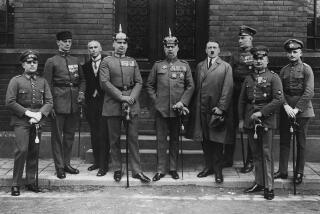Seeing Signs of a Police State
- Share via
Your Dec. 2 editorial, “Questioning Secrecy,” is absolutely on target. Congress indeed must ask some hard questions about President Bush’s sudden and sweeping erosion of civil liberties in the name of combating terrorism.
Assuming dictatorial powers, Bush has now in effect declared the Bill of Rights null and void, with secret tribunals, trashing of the attorney-client privilege, racial profiling and other encroachments on civil liberties.
Bush also is imposing secrecy in government on issues that have nothing at all to do with the terrorist attacks. His executive order of Nov. 1 effectively blocks scholars, journalists and any other citizens from obtaining presidential records. At the same time, the administration is weakening and constricting the Freedom of Information Act, further eroding the people’s right to know and democracy itself. All these sorts of abuses have occurred before, notably in 1930s Nazi Germany.
The wave of patriotism now sweeping the country would be more inspiring to me if it included a little less flag-waving and a lot more vigilance and raising of voices against this regime’s assaults on freedom.
Michael Briley
Ojai
“Bush Can’t Rely on the FDR Precedent” (Opinion, Dec. 2) is most apt. The Bush administration’s reliance on the 1942 case of the eight German saboteurs is akin to calling a cow an elephant because they both have four legs. In 1942 we were at war (duly declared by Congress) against a foreign country whose agents the saboteurs were.
George M. Heil
Santa Barbara
In moves to free our country from further acts of terror, Atty. Gen. John Ashcroft has created two tiers of justice: one for those who look Middle Eastern and one for those who look like Timothy McVeigh.
Tarik Trad
Glendale
Re “None Jailed in U.S. Face Tribunals,” Nov. 30: Day-by-day revelations make clear that the Bush administration’s plan to use military tribunals was hasty, ill-conceived and half-baked. Even now, Pentagon military lawyers are working to define the rules, justifying military tribunals with the precedents of the war-crime trials at the end of World War II. The announcement that the tribunals wouldn’t be held in the U.S. makes this look more and more like a Third World standard of justice.
Aside from the fact that there is no declared war, the Pentagon lawyers might consider some other precedents. The cruel uprooting and internment of Japanese families during WWII created wounds to our system of justice that have scarcely healed after nearly 60 years. That action was also very popular with the general public, but a popular action isn’t necessarily wise or just. Cruel and barbarous as the Sept. 11 attack was, it does not justify corrupting our system of justice and tearing at the fabric of our democratic ideals.
Julian Roberts
Redlands
Re “Bush Defends War Tribunals,” Nov. 30: If a single civilian Arab, or any civilian, is tried without having been afforded the right to be judged by a jury of 12 civilian peers, after exercising the right to subpoena and the cross-examination of witnesses against him, with all evidence weighed by the standard of “beyond a reasonable doubt” and, finally, the inalienable right to freedom retracted only after the unanimous verdict of that same jury, then the free world’s war against the terrorists has been lost.
David P. Carmichael
Covina
Due to an undeclared war, we are having to abandon many civil liberties. How will we know when the war is over? What conditions will have to be met before the liberties will be reinstated?
Bob Brigham
Manhattan Beach
Re “Innocuous Make List, but Notables Don’t,” Nov. 28: Detaining people because they worked with a suspected terrorist, went to the same mosque or lied on a visa application is not only a civil rights violation, it is also very dumb police work. Wouldn’t it be better to place such people under surveillance without tipping them off that they are suspects and see whom they contact and what they do?
Unless you plan on violating their rights further by using torture or other unethical, coercive measures, it seems unlikely that you could get a detained person to admit to being a terrorist or to lead you to one.
Richard Kaeller
Calabasas










